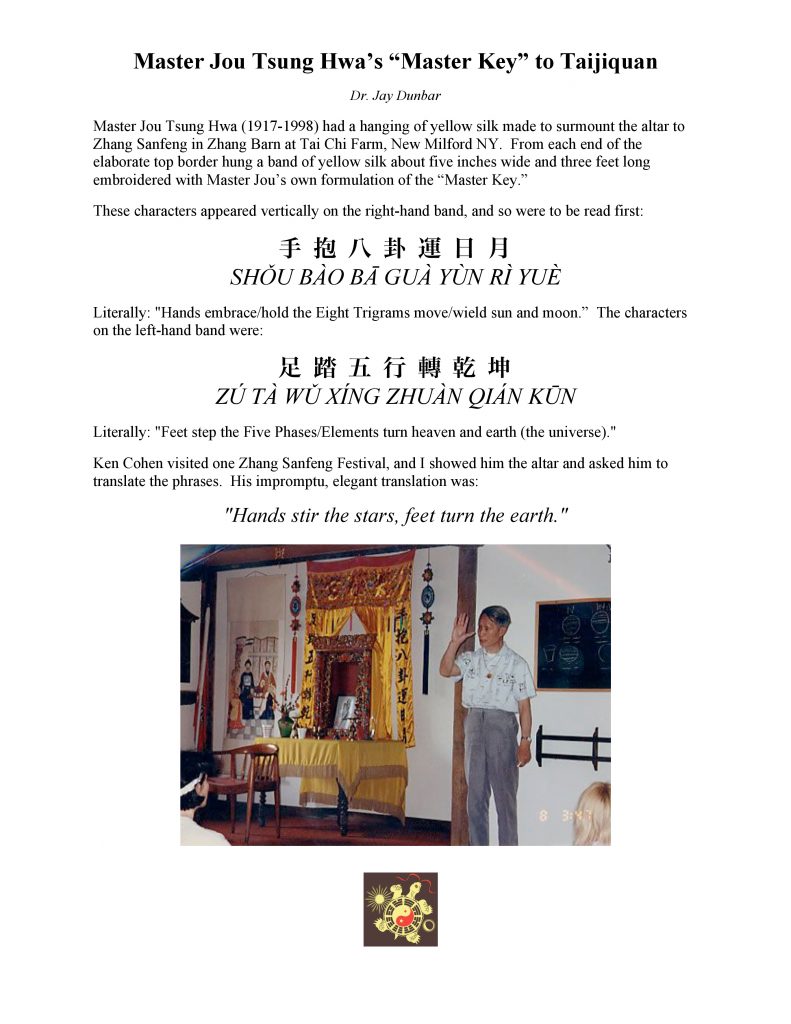Master Jou was indeed an internal arts rebel so let’s hear directly from the Master. In the following videos, we can catch a glimpse of the man and his teachings. He was always learning, researching, and improving. One of his students said, “He would come into class one day and say that he had made a breakthrough”, which was one of his expressions for gaining a new understanding. We would work on this lesson and then the next day he might come back and say, “Ah, I have discovered this better idea, so we do not have to worry about the other lesson yesterday.” And it would go on and on like this. He was always learning and sharing his discoveries with us for as long as we knew him.
Master Jou Lecture on Training Taijiquan
At the opening ceremonies for the 1997 Zhang San Feng festival in Warwick New York, Master Jou gave an impromptu lecture on how he had evolved in his understanding of Taijiquan over the many years he had been studying and training the various styles that make up the five major styles of Taijiquan. He talked about the mistakes he made in the beginning and how he finally realized that the answers were not in books or films, but in developing himself from the inside out. This lecture has many great tips and insights. You will have to listen carefully and perhaps play it more than once as his accent is not that easy to understand. However when you can grasp his meaning a new door in your knowledge base may open.
Six Discussions on the Internal Energies of Taijiquan
These six interviews conducted by Taijiquan instructor Bob Krueger in 1994, take a deep dive into Master Jou’s philosophy and encyclopedic knowledge of the internal skills developed by serious practice of Taijiquan. What most people admired about this skilled master was that he was not aloof or shy about sharing his discoveries with anyone who was willing to listen. He never called himself by any titles, Shifu, master and such were not in his vocabulary.
Master Jou Qi Development Interview Part 1
Taijiquan teacher Bob Krueger interviews Master Jou on his teachings about sensing Qi, developing it, dantian power pre-birth breathing, microcosmic orbit, qi as used in martial arts and healing and Taoist vs western philosophy.
Master Jou Interview Part 2
Taijiquan teacher Bob Krueger interviews Master Jou on his teachings about Nei jia in Chen, Yang & Wu/Hao Taijiquan. He also explains how dantian movements lead outer movements in the forms and the role of Changsijin (silk reeling) and Fajin (pulsing force). Included is a discussion of the Taijiquan classics and how to simplify and focus to make internal progress along with energy absorption for forms practice and using pre-birth breathing.
Master Jou Interview Part 3
Taijiquan teacher Bob Krueger interviews Master Jou on his teachings about the methods of Changsijin (silk reeling) for martial arts and healing, planetary orbits, whole body power, the Taiji Tu diagram used in Taijiquan form practice, and dantian compression and expansion.
Master Jou Interview Part 4
Taijiquan teacher Bob Krueger interviews Master Jou about his idea that quality is more important than quantity for real progress. Also included are discussions on the five element theory to enhance martial arts development and healing plus the difference between correct practice versus hard practice.
Master Jou Interview Part 5
Taijiquan teacher Bob Krueger interviews Master Jou on how the Taijiquan Classics and Taoist philosophy guided him in developing his abilities. He discusses the metaphor of Taoist energy development and how it is similar to Taijiquan martial arts development from hand stage to torso method (whole body) and finally the “Mind Method.” Master Jou speaks how the intent developer in Chen Taijiquan should once understood be concealed in the Yang Form.
Master Jou Interview Part 6 Final Interview
Taijiquan teacher Bob Krueger interviews Master Jou on why breathing without breathing, as in Pre-Birth Breathing, is a higher stage than what some call Reverse Breathing. He explains how his Breathing Without Breathing (Wuxizhixi) can develop martial arts power.

